Hexagramme 26 du Yi Jing - Trait 4
L'hexagramme : 26
Un hexagramme est une combinaison de six traits yin et yang.

26.4 (26 > 14) - THE TÂ KHÛ HEXAGRAM.
The fourth line, divided, shows the young bull, (and yet) having the piece of wood over his horns. There will be great good fortune.
Bing DeepL Google Yandex26.4 (26 > 14) - Surrendering to the resistance
One controls the other's aggressiveness by yielding.
Bing DeepL Google Yandex26.4 (26 > 14) - Surrendering to the resistance
One controls the other's aggressiveness by yielding.
Bing DeepL Google Yandex26.4 (26 > 14) - Tá tchu, le pouvoir contraignant de la grandeur
Tá tchu : 1. Grand entretien ; 2. Dompter, conduire
Le joug, la planchette que porte le jeune boeuf est d’un usage très heureux pour le dompter et le former au labourage (second sens).
Bing DeepL Google Yandex26.4 (26 > 14) - Se rendre à la résistance
On maîtrise l'agressivité de l'autre en cédant.
Bing DeepL Google YandexLes trigrammes
Les trigrammes sont des combinaisons de trois traits yin et yang. Dans l'hexagramme, les trois traits du dessous constituent le trigramme inférieur et représentent la situation intérieure. Les trois lignes du haut constituent le trigramme supérieur et représentent la situation extérieure.
trigSup2


trigInf

L'hexagramme nucléaire : 54.3.5 (54 > 43)
L'hexagramme nucléaire est l'association des deux trigrammes intérieurs (traits 2,3,4 et 3,4,5). Il représente la racine, ou l'origine de la situation.
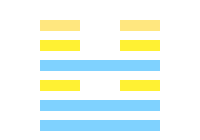
54.3.5 (54 > 43) - THE KWEI MEI HEXAGRAM.
- 3. The third line, divided, shows the younger sister who was to be married off in a mean position. She returns and accepts an ancillary position.
- 5. The fifth line, divided, reminds us of the marrying of the younger sister of (king) Tî-yî, when the sleeves of her the princess were not equal to those of the (still) younger sister who accompanied her in an inferior capacity. (The case suggests the thought of) the moon almost full. There will be good fortune.
54.3.5 (54 > 43) - Assistance
One fools everyone around by feigning to be seduced.
Bing DeepL Google Yandex54.3.5 (54 > 43) - Assistance
One fools everyone around by feigning to be seduced.
Bing DeepL Google Yandex54.3.5 (54 > 43) - Kvêi Mei, la fille à marier
Kvêi-Mei : marier une jeune sœur, une jeune fille.
- 3. Elle est comme un borgne qui voit encore, mais mal (qui ne voit d’un oeil). [Il lui sera avantageux de vivre retirée et ferme en sa vertu, de ne point faillir aux règles du devoir.]
-
5. Quand l’empereur Ti-Y maria sa sœur, les manches (le vêtement) de lamariée étaient moins richement ornées que celles de sa plus jeune sœur.
Note. Voir Koua II, texte II, § 5. La mariée avait perdu sa qualité de princesse royale.
Elle était comme la lune presque pleine (quant à sa vertu) de modestie, de soumission. C’était de très heureux augure. Telle fut sa noble conduite. [Ainsi elle maintint sa dignité dans la droiture.]
54.3.5 (54 > 43) - L'assistance
On trompe son monde en affectant d'être séduit.
Bing DeepL Google Yandex54.3.5 (54 > 43) - Támogatás
- 3. Elfogadja a fiatalabb készségeinek felhasználását mielőtt feladnák.
- 5. Visszatér miután a többieket kikérdezi.
Le dérivé (Fan Yao) : 14.4
Le même trait sur l'hexagramme après la mutation. Il représente ce qui peut être fait APRÈS pour corriger la situation décrite par ce trait, un peu comme un remède ou une solution.

14.4 (14 > 26) - THE TÂ YÛ HEXAGRAM.
The fourth line, undivided, shows its subject keeping his great resources under restraint. There will be no error.
Bing DeepL Google Yandex14.4 (14 > 26) - Not diverting oneself
One doesn't defy others by choosing another way.
Bing DeepL Google Yandex14.4 (14 > 26) - Not diverting oneself
One doesn't defy others by choosing another way.
Bing DeepL Google Yandex14.4 (14 > 26) - Ta, le grand avoir
Tá : grand, grandeur, grandir, développement.
L’homme grand ne commet pas de faute concernant ce qui ne lui appartient pas (n’est pas son droit).
Il le distingue clairement.
14.4 (14 > 26) - Ne pas se détourner
On ne défie pas les autres en choisissant une autre voie.
Bing DeepL Google Yandex14.4 (14 > 26) - Az igények kielégítése
Nem fordul el hogy szembeszálljon másokkal.
Bing DeepL Google YandexLa jointure: 13.3
Le dérivé du réciproque. Il représente ce qui aurait pu être fait AVANT pour prévenir la situation décrite par ce trait, un peu comme un remède ou une solution.

13.3 (13 > 25) - THE THUNG ZĂN HEXAGRAM.
The third line, undivided, (shows its subject) with his arms hidden in the thick grass, and at the top of a high mound. (But) for three years he makes no demonstration.
Bing DeepL Google Yandex13.3 (13 > 25) - T’ong, la compagnie fraternelle des hommes
T’ong : union, harmonie.
(Moyen de garder l’union.) Cacher ses armes tout en restant vigilant (sur son élévation) et ne point les relever de longtemps (litt. : trois ans).
Agir toujours pacifiquement.
Le réciproque : 25.3
L'hexagramme renversé. Il représente la situation opposée, et en tant que tel est essentiel pour la validation des commentaires.

25.3 (25 > 13) - THE WÛ WANG HEXAGRAM.
The third line, divided, shows calamity happening to one who is free from insincerity ; as in the case of an ox that has been tied up. A passer by finds it (and carries it off), while the people in the neighbourhood have the calamity (of being accused and apprehended).
Bing DeepL Google Yandex25.3 (25 > 13) - Detaching oneself
Another has taken what one liked because one forgot it.
Bing DeepL Google Yandex25.3 (25 > 13) - Detaching oneself
Another has taken what one liked because one forgot it.
Bing DeepL Google Yandex25.3 (25 > 13) - Wu wâng, l’innocence, l’imprévu
Wu wāng : sans blâme, irréprochable, honnête.
Celui dont la conduite est parfaite peut cependant avoir quelque malheur immérité ; c’est comme un boeuf (innocent) attaché ; son conducteur le traîne ; les gens de l’endroit le maltraitent.
Bing DeepL Google Yandex25.3 (25 > 13) - Se détacher
Un autre a pris ce qu'on appréciait car on l'a oublié.
Bing DeepL Google Yandex25.3 (25 > 13) - Vakmerőség
Egy másik elvette amiben örömét lelte mert elfeledkezett róla.
Bing DeepL Google YandexMutations

26.4 (26 > 14) - THE TÂ KHÛ HEXAGRAM.
The fourth line, divided, shows the young bull, (and yet) having the piece of wood over his horns. There will be great good fortune.
Bing DeepL Google Yandex26.4 (26 > 14) - Surrendering to the resistance
One controls the other's aggressiveness by yielding.
Bing DeepL Google Yandex26.4 (26 > 14) - Surrendering to the resistance
One controls the other's aggressiveness by yielding.
Bing DeepL Google Yandex26.4 (26 > 14) - Tá tchu, le pouvoir contraignant de la grandeur
Tá tchu : 1. Grand entretien ; 2. Dompter, conduire
Le joug, la planchette que porte le jeune boeuf est d’un usage très heureux pour le dompter et le former au labourage (second sens).
Bing DeepL Google Yandex26.4 (26 > 14) - Se rendre à la résistance
On maîtrise l'agressivité de l'autre en cédant.
Bing DeepL Google Yandex
26.1.4 (26 > 50) - THE TÂ KHÛ HEXAGRAM.
- 1. The first line, undivided, shows its subject in a position of peril. It will be advantageous for him to stop his advance.
- 4. The fourth line, divided, shows the young bull, (and yet) having the piece of wood over his horns. There will be great good fortune.
26.1.4 (26 > 50) - Ensuring safety prevails
One finishes late because of inspections that took longer than expected.
Bing DeepL Google Yandex26.1.4 (26 > 50) - Ensuring safety prevails
One finishes late because of inspections that took longer than expected.
Bing DeepL Google Yandex26.1.4 (26 > 50) - Tá tchu, le pouvoir contraignant de la grandeur
Tá tchu : 1. Grand entretien ; 2. Dompter, conduire
- 1. Quand il survient quelque danger, il est bon de s’arrêter (se vaincre), de céder aux circonstances et de ne point vouloir l’emporter de force.
- 4. Le joug, la planchette que porte le jeune boeuf est d’un usage très heureux pour le dompter et le former au labourage (second sens).
26.1.4 (26 > 50) - Faire prévaloir la sécurité
On termine en retard à cause des inspections qui ont duré plus longtemps que prévu.
Bing DeepL Google Yandex26.1.4 (26 > 50) - Ellenőrzés
- 1. Nem akar menni és azonnal megnézni mert nem olyan fontos.
- 4. A másik erőszakosságának kezelése adakozással.

26.2.4 (26 > 30) - THE TÂ KHÛ HEXAGRAM.
- 2. The second line, undivided, shows a carriage with the strap under it removed.
- 4. The fourth line, divided, shows the young bull, (and yet) having the piece of wood over his horns. There will be great good fortune.
26.2.4 (26 > 30) - Anticipating the end
One will know how to tell others what one wants.
Bing DeepL Google Yandex26.2.4 (26 > 30) - Anticipating the end
One will know how to tell others what one wants.
Bing DeepL Google Yandex26.2.4 (26 > 30) - Tá tchu, le pouvoir contraignant de la grandeur
Tá tchu : 1. Grand entretien ; 2. Dompter, conduire
- 2. (Comme, par exemple, quand) un char a perdu le cuir qui le maintient en place (droit).
- 4. Le joug, la planchette que porte le jeune boeuf est d’un usage très heureux pour le dompter et le former au labourage (second sens).
26.2.4 (26 > 30) - Prévoir la fin
On saura dire aux autres ce que l'on veut.
Bing DeepL Google Yandex26.2.4 (26 > 30) - Ellenőrzés
- 2. Otthagyja mert nem bíznak benne.
- 4. A másik erőszakosságának kezelése adakozással.

26.1.2.4 (26 > 56) - THE TÂ KHÛ HEXAGRAM.
- 1. The first line, undivided, shows its subject in a position of peril. It will be advantageous for him to stop his advance.
- 2. The second line, undivided, shows a carriage with the strap under it removed.
- 4. The fourth line, divided, shows the young bull, (and yet) having the piece of wood over his horns. There will be great good fortune.
26.1.2.4 (26 > 56) - Showing one's disappointment by pouting
One has caught a disease that is not listed in the records.
Bing DeepL Google Yandex26.1.2.4 (26 > 56) - Showing one's disappointment by pouting
One has caught a disease that is not listed in the records.
Bing DeepL Google Yandex26.1.2.4 (26 > 56) - Tá tchu, le pouvoir contraignant de la grandeur
Tá tchu : 1. Grand entretien ; 2. Dompter, conduire
- 1. Quand il survient quelque danger, il est bon de s’arrêter (se vaincre), de céder aux circonstances et de ne point vouloir l’emporter de force.
- 2. (Comme, par exemple, quand) un char a perdu le cuir qui le maintient en place (droit).
- 4. Le joug, la planchette que porte le jeune boeuf est d’un usage très heureux pour le dompter et le former au labourage (second sens).
26.1.2.4 (26 > 56) - Montrer sa déception en faisant la moue
On a attrapé une maladie qui n'est pas répertoriée dans les annales.
Bing DeepL Google Yandex26.1.2.4 (26 > 56) - Ellenőrzés
- 1. Nem akar menni és azonnal megnézni mert nem olyan fontos.
- 2. Otthagyja mert nem bíznak benne.
- 4. A másik erőszakosságának kezelése adakozással.

26.3.4 (26 > 38) - THE TÂ KHÛ HEXAGRAM.
- 3. The third line, undivided, shows its subject urging his way with good horses. It will be advantageous for him to realise the difficulty (of his course), and to be firm and correct, exercising himself daily in his charioteering and methods of defence; then there will be advantage in whatever direction he may advance.
- 4. The fourth line, divided, shows the young bull, (and yet) having the piece of wood over his horns. There will be great good fortune.
26.3.4 (26 > 38) - Promote one's wards
One assigns one's best student to an assistant position.
Bing DeepL Google Yandex26.3.4 (26 > 38) - Promote one's wards
One assigns one's best student to an assistant position.
Bing DeepL Google Yandex26.3.4 (26 > 38) - Tá tchu, le pouvoir contraignant de la grandeur
Tá tchu : 1. Grand entretien ; 2. Dompter, conduire
- 3. Celui qui chemine avec des chevaux bien entretenus, sortira heureusement des difficultés. S’il s’exerce chaque jour à conduire et combattre, tout réussira pour lui. (Suite de la bonne éducation.)
- 4. Le joug, la planchette que porte le jeune boeuf est d’un usage très heureux pour le dompter et le former au labourage (second sens).
26.3.4 (26 > 38) - Promouvoir ses pupilles
On affecte son meilleur élève à un poste d'assistant.
Bing DeepL Google Yandex26.3.4 (26 > 38) - Ellenőrzés
- 3. Elkíséri.
- 4. A másik erőszakosságának kezelése adakozással.

26.1.3.4 (26 > 64) - THE TÂ KHÛ HEXAGRAM.
- 1. The first line, undivided, shows its subject in a position of peril. It will be advantageous for him to stop his advance.
- 3. The third line, undivided, shows its subject urging his way with good horses. It will be advantageous for him to realise the difficulty (of his course), and to be firm and correct, exercising himself daily in his charioteering and methods of defence; then there will be advantage in whatever direction he may advance.
- 4. The fourth line, divided, shows the young bull, (and yet) having the piece of wood over his horns. There will be great good fortune.
26.1.3.4 (26 > 64) - Knowing how to proceed
One knows the principles by which one must act.
Bing DeepL Google Yandex26.1.3.4 (26 > 64) - Knowing how to proceed
One knows the principles by which one must act.
Bing DeepL Google Yandex26.1.3.4 (26 > 64) - Tá tchu, le pouvoir contraignant de la grandeur
Tá tchu : 1. Grand entretien ; 2. Dompter, conduire
- 1. Quand il survient quelque danger, il est bon de s’arrêter (se vaincre), de céder aux circonstances et de ne point vouloir l’emporter de force.
- 3. Celui qui chemine avec des chevaux bien entretenus, sortira heureusement des difficultés. S’il s’exerce chaque jour à conduire et combattre, tout réussira pour lui. (Suite de la bonne éducation.)
- 4. Le joug, la planchette que porte le jeune boeuf est d’un usage très heureux pour le dompter et le former au labourage (second sens).
26.1.3.4 (26 > 64) - Connaître la procédure
On connait les principes selon lesquels il faut agir.
Bing DeepL Google Yandex26.1.3.4 (26 > 64) - Ellenőrzés
- 1. Nem akar menni és azonnal megnézni mert nem olyan fontos.
- 3. Elkíséri.
- 4. A másik erőszakosságának kezelése adakozással.

26.2.3.4 (26 > 21) - THE TÂ KHÛ HEXAGRAM.
- 2. The second line, undivided, shows a carriage with the strap under it removed.
- 3. The third line, undivided, shows its subject urging his way with good horses. It will be advantageous for him to realise the difficulty (of his course), and to be firm and correct, exercising himself daily in his charioteering and methods of defence; then there will be advantage in whatever direction he may advance.
- 4. The fourth line, divided, shows the young bull, (and yet) having the piece of wood over his horns. There will be great good fortune.
26.2.3.4 (26 > 21) - Running out of time
One regrets lacking of time to do what one would have liked.
Bing DeepL Google Yandex26.2.3.4 (26 > 21) - Running out of time
One regrets lacking of time to do what one would have liked.
Bing DeepL Google Yandex26.2.3.4 (26 > 21) - Tá tchu, le pouvoir contraignant de la grandeur
Tá tchu : 1. Grand entretien ; 2. Dompter, conduire
- 2. (Comme, par exemple, quand) un char a perdu le cuir qui le maintient en place (droit).
- 3. Celui qui chemine avec des chevaux bien entretenus, sortira heureusement des difficultés. S’il s’exerce chaque jour à conduire et combattre, tout réussira pour lui. (Suite de la bonne éducation.)
- 4. Le joug, la planchette que porte le jeune boeuf est d’un usage très heureux pour le dompter et le former au labourage (second sens).
26.2.3.4 (26 > 21) - Manquer de temps
On regrette de ne pas avoir eu le temps de faire ce qu'on aurait voulu.
Bing DeepL Google Yandex26.2.3.4 (26 > 21) - Ellenőrzés
- 2. Otthagyja mert nem bíznak benne.
- 3. Elkíséri.
- 4. A másik erőszakosságának kezelése adakozással.

26.1.2.3.4 (26 > 35) - THE TÂ KHÛ HEXAGRAM.
- 1. The first line, undivided, shows its subject in a position of peril. It will be advantageous for him to stop his advance.
- 2. The second line, undivided, shows a carriage with the strap under it removed.
- 3. The third line, undivided, shows its subject urging his way with good horses. It will be advantageous for him to realise the difficulty (of his course), and to be firm and correct, exercising himself daily in his charioteering and methods of defence; then there will be advantage in whatever direction he may advance.
- 4. The fourth line, divided, shows the young bull, (and yet) having the piece of wood over his horns. There will be great good fortune.
26.1.2.3.4 (26 > 35) - Having the required capacities
One knows the ways and means by which one can succeed in doing what was planned.
Bing DeepL Google Yandex26.1.2.3.4 (26 > 35) - Having the required capacities
One knows the ways and means by which one can succeed in doing what was planned.
Bing DeepL Google Yandex26.1.2.3.4 (26 > 35) - Tá tchu, le pouvoir contraignant de la grandeur
Tá tchu : 1. Grand entretien ; 2. Dompter, conduire
- 1. Quand il survient quelque danger, il est bon de s’arrêter (se vaincre), de céder aux circonstances et de ne point vouloir l’emporter de force.
- 2. (Comme, par exemple, quand) un char a perdu le cuir qui le maintient en place (droit).
- 3. Celui qui chemine avec des chevaux bien entretenus, sortira heureusement des difficultés. S’il s’exerce chaque jour à conduire et combattre, tout réussira pour lui. (Suite de la bonne éducation.)
- 4. Le joug, la planchette que porte le jeune boeuf est d’un usage très heureux pour le dompter et le former au labourage (second sens).
26.1.2.3.4 (26 > 35) - Avoir les capacités requises
On connaît les voies et les moyens par lesquels on peut réussir à faire ce qu'on avait prévu.
Bing DeepL Google Yandex26.1.2.3.4 (26 > 35) - Ellenőrzés
- 1. Nem akar menni és azonnal megnézni mert nem olyan fontos.
- 2. Otthagyja mert nem bíznak benne.
- 3. Elkíséri.
- 4. A másik erőszakosságának kezelése adakozással.

26.4.5 (26 > 1) - THE TÂ KHÛ HEXAGRAM.
- 4. The fourth line, divided, shows the young bull, (and yet) having the piece of wood over his horns. There will be great good fortune.
- 5. The fifth line, divided, shows the teeth of a castrated hog. There will be good fortune.
26.4.5 (26 > 1) - Losing one's identity
One frees oneself by yielding to the will of those who control.
Bing DeepL Google Yandex26.4.5 (26 > 1) - Losing one's identity
One frees oneself by yielding to the will of those who control.
Bing DeepL Google Yandex26.4.5 (26 > 1) - Tá tchu, le pouvoir contraignant de la grandeur
Tá tchu : 1. Grand entretien ; 2. Dompter, conduire
- 4. Le joug, la planchette que porte le jeune boeuf est d’un usage très heureux pour le dompter et le former au labourage (second sens).
- 5. Lorsqu’un sanglier est châtré, dompté, ses défenses sont exemptes de danger (et sont plutôt un instrument utile). — Arracher les dents à un sanglier, c’est priver un méchant des moyens de nuire.
26.4.5 (26 > 1) - Perdre son identité
On se libère en cédant à la volonté de ceux qui contrôlent.
Bing DeepL Google Yandex26.4.5 (26 > 1) - Ellenőrzés
- 4. A másik erőszakosságának kezelése adakozással.
- 5. Vár amíg a legfiatalabb visszatér javítani.

26.1.4.5 (26 > 44) - THE TÂ KHÛ HEXAGRAM.
- 1. The first line, undivided, shows its subject in a position of peril. It will be advantageous for him to stop his advance.
- 4. The fourth line, divided, shows the young bull, (and yet) having the piece of wood over his horns. There will be great good fortune.
- 5. The fifth line, divided, shows the teeth of a castrated hog. There will be good fortune.
26.1.4.5 (26 > 44) - Having an obsession
One is tormented by an unimportant detail, so one looks for ways to fix it.
Bing DeepL Google Yandex26.1.4.5 (26 > 44) - Having an obsession
One is tormented by an unimportant detail, so one looks for ways to fix it.
Bing DeepL Google Yandex26.1.4.5 (26 > 44) - Tá tchu, le pouvoir contraignant de la grandeur
Tá tchu : 1. Grand entretien ; 2. Dompter, conduire
- 1. Quand il survient quelque danger, il est bon de s’arrêter (se vaincre), de céder aux circonstances et de ne point vouloir l’emporter de force.
- 4. Le joug, la planchette que porte le jeune boeuf est d’un usage très heureux pour le dompter et le former au labourage (second sens).
- 5. Lorsqu’un sanglier est châtré, dompté, ses défenses sont exemptes de danger (et sont plutôt un instrument utile). — Arracher les dents à un sanglier, c’est priver un méchant des moyens de nuire.
26.1.4.5 (26 > 44) - Avoir une idée fixe
On est tourmenté par un détail sans importance, alors on se met en quête des moyens d'y remédier.
Bing DeepL Google Yandex26.1.4.5 (26 > 44) - Ellenőrzés
- 1. Nem akar menni és azonnal megnézni mert nem olyan fontos.
- 4. A másik erőszakosságának kezelése adakozással.
- 5. Vár amíg a legfiatalabb visszatér javítani.
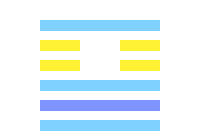
26.2.4.5 (26 > 13) - THE TÂ KHÛ HEXAGRAM.
- 2. The second line, undivided, shows a carriage with the strap under it removed.
- 4. The fourth line, divided, shows the young bull, (and yet) having the piece of wood over his horns. There will be great good fortune.
- 5. The fifth line, divided, shows the teeth of a castrated hog. There will be good fortune.
26.2.4.5 (26 > 13) - Not letting anything come out
One does not elaborate on the content of what one has learned with others.
Bing DeepL Google Yandex26.2.4.5 (26 > 13) - Not letting anything come out
One does not elaborate on the content of what one has learned with others.
Bing DeepL Google Yandex26.2.4.5 (26 > 13) - Tá tchu, le pouvoir contraignant de la grandeur
Tá tchu : 1. Grand entretien ; 2. Dompter, conduire
- 2. (Comme, par exemple, quand) un char a perdu le cuir qui le maintient en place (droit).
- 4. Le joug, la planchette que porte le jeune boeuf est d’un usage très heureux pour le dompter et le former au labourage (second sens).
- 5. Lorsqu’un sanglier est châtré, dompté, ses défenses sont exemptes de danger (et sont plutôt un instrument utile). — Arracher les dents à un sanglier, c’est priver un méchant des moyens de nuire.
26.2.4.5 (26 > 13) - Ne rien laisser transpirer
On ne s'étend pas pas sur le contenu de ce qu'on a appris avec les autres.
Bing DeepL Google Yandex26.2.4.5 (26 > 13) - Ellenőrzés
- 2. Otthagyja mert nem bíznak benne.
- 4. A másik erőszakosságának kezelése adakozással.
- 5. Vár amíg a legfiatalabb visszatér javítani.

26.1.2.4.5 (26 > 33) - THE TÂ KHÛ HEXAGRAM.
- 1. The first line, undivided, shows its subject in a position of peril. It will be advantageous for him to stop his advance.
- 2. The second line, undivided, shows a carriage with the strap under it removed.
- 4. The fourth line, divided, shows the young bull, (and yet) having the piece of wood over his horns. There will be great good fortune.
- 5. The fifth line, divided, shows the teeth of a castrated hog. There will be good fortune.
26.1.2.4.5 (26 > 33) - Hiding the loot
One spies on their relatives to find out where they have hidden what one has been looking for for a very long time.
Bing DeepL Google Yandex26.1.2.4.5 (26 > 33) - Hiding the loot
One spies on their relatives to find out where they have hidden what one has been looking for for a very long time.
Bing DeepL Google Yandex26.1.2.4.5 (26 > 33) - Tá tchu, le pouvoir contraignant de la grandeur
Tá tchu : 1. Grand entretien ; 2. Dompter, conduire
- 1. Quand il survient quelque danger, il est bon de s’arrêter (se vaincre), de céder aux circonstances et de ne point vouloir l’emporter de force.
- 2. (Comme, par exemple, quand) un char a perdu le cuir qui le maintient en place (droit).
- 4. Le joug, la planchette que porte le jeune boeuf est d’un usage très heureux pour le dompter et le former au labourage (second sens).
- 5. Lorsqu’un sanglier est châtré, dompté, ses défenses sont exemptes de danger (et sont plutôt un instrument utile). — Arracher les dents à un sanglier, c’est priver un méchant des moyens de nuire.
26.1.2.4.5 (26 > 33) - Planquer le magot
On épie ses proches pour savoir où ils ont caché ce qu'on cherche depuis très longtemps.
Bing DeepL Google Yandex26.1.2.4.5 (26 > 33) - Ellenőrzés
- 1. Nem akar menni és azonnal megnézni mert nem olyan fontos.
- 2. Otthagyja mert nem bíznak benne.
- 4. A másik erőszakosságának kezelése adakozással.
- 5. Vár amíg a legfiatalabb visszatér javítani.

26.3.4.5 (26 > 10) - THE TÂ KHÛ HEXAGRAM.
- 3. The third line, undivided, shows its subject urging his way with good horses. It will be advantageous for him to realise the difficulty (of his course), and to be firm and correct, exercising himself daily in his charioteering and methods of defence; then there will be advantage in whatever direction he may advance.
- 4. The fourth line, divided, shows the young bull, (and yet) having the piece of wood over his horns. There will be great good fortune.
- 5. The fifth line, divided, shows the teeth of a castrated hog. There will be good fortune.
26.3.4.5 (26 > 10) - Knowing how to keep up with the vogue
One sees that things are evolving very quickly so one changes with them.
Bing DeepL Google Yandex26.3.4.5 (26 > 10) - Knowing how to keep up with the vogue
One sees that things are evolving very quickly so one changes with them.
Bing DeepL Google Yandex26.3.4.5 (26 > 10) - Tá tchu, le pouvoir contraignant de la grandeur
Tá tchu : 1. Grand entretien ; 2. Dompter, conduire
- 3. Celui qui chemine avec des chevaux bien entretenus, sortira heureusement des difficultés. S’il s’exerce chaque jour à conduire et combattre, tout réussira pour lui. (Suite de la bonne éducation.)
- 4. Le joug, la planchette que porte le jeune boeuf est d’un usage très heureux pour le dompter et le former au labourage (second sens).
- 5. Lorsqu’un sanglier est châtré, dompté, ses défenses sont exemptes de danger (et sont plutôt un instrument utile). — Arracher les dents à un sanglier, c’est priver un méchant des moyens de nuire.
26.3.4.5 (26 > 10) - Savoir suivre l'air du temps
On voit que les choses évoluent à vive allure alors on change avec elles.
Bing DeepL Google Yandex26.3.4.5 (26 > 10) - Ellenőrzés
- 3. Elkíséri.
- 4. A másik erőszakosságának kezelése adakozással.
- 5. Vár amíg a legfiatalabb visszatér javítani.
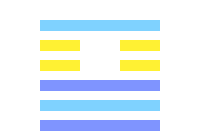
26.1.3.4.5 (26 > 6) - THE TÂ KHÛ HEXAGRAM.
- 1. The first line, undivided, shows its subject in a position of peril. It will be advantageous for him to stop his advance.
- 3. The third line, undivided, shows its subject urging his way with good horses. It will be advantageous for him to realise the difficulty (of his course), and to be firm and correct, exercising himself daily in his charioteering and methods of defence; then there will be advantage in whatever direction he may advance.
- 4. The fourth line, divided, shows the young bull, (and yet) having the piece of wood over his horns. There will be great good fortune.
- 5. The fifth line, divided, shows the teeth of a castrated hog. There will be good fortune.
26.1.3.4.5 (26 > 6) - Selecting one's team
One shows others what one has chosen for the competition.
Bing DeepL Google Yandex26.1.3.4.5 (26 > 6) - Selecting one's team
One shows others what one has chosen for the competition.
Bing DeepL Google Yandex26.1.3.4.5 (26 > 6) - Tá tchu, le pouvoir contraignant de la grandeur
Tá tchu : 1. Grand entretien ; 2. Dompter, conduire
- 1. Quand il survient quelque danger, il est bon de s’arrêter (se vaincre), de céder aux circonstances et de ne point vouloir l’emporter de force.
- 3. Celui qui chemine avec des chevaux bien entretenus, sortira heureusement des difficultés. S’il s’exerce chaque jour à conduire et combattre, tout réussira pour lui. (Suite de la bonne éducation.)
- 4. Le joug, la planchette que porte le jeune boeuf est d’un usage très heureux pour le dompter et le former au labourage (second sens).
- 5. Lorsqu’un sanglier est châtré, dompté, ses défenses sont exemptes de danger (et sont plutôt un instrument utile). — Arracher les dents à un sanglier, c’est priver un méchant des moyens de nuire.
26.1.3.4.5 (26 > 6) - Sélectionner son équipe
On montre aux autres ce qu'on a choisi pour la compétition.
Bing DeepL Google Yandex26.1.3.4.5 (26 > 6) - Ellenőrzés
- 1. Nem akar menni és azonnal megnézni mert nem olyan fontos.
- 3. Elkíséri.
- 4. A másik erőszakosságának kezelése adakozással.
- 5. Vár amíg a legfiatalabb visszatér javítani.

26.2.3.4.5 (26 > 25) - THE TÂ KHÛ HEXAGRAM.
- 2. The second line, undivided, shows a carriage with the strap under it removed.
- 3. The third line, undivided, shows its subject urging his way with good horses. It will be advantageous for him to realise the difficulty (of his course), and to be firm and correct, exercising himself daily in his charioteering and methods of defence; then there will be advantage in whatever direction he may advance.
- 4. The fourth line, divided, shows the young bull, (and yet) having the piece of wood over his horns. There will be great good fortune.
- 5. The fifth line, divided, shows the teeth of a castrated hog. There will be good fortune.
26.2.3.4.5 (26 > 25) - Seducing with finesse
One is charmed by courteous gestures.
Bing DeepL Google Yandex26.2.3.4.5 (26 > 25) - Seducing with finesse
One is charmed by courteous gestures.
Bing DeepL Google Yandex26.2.3.4.5 (26 > 25) - Tá tchu, le pouvoir contraignant de la grandeur
Tá tchu : 1. Grand entretien ; 2. Dompter, conduire
- 2. (Comme, par exemple, quand) un char a perdu le cuir qui le maintient en place (droit).
- 3. Celui qui chemine avec des chevaux bien entretenus, sortira heureusement des difficultés. S’il s’exerce chaque jour à conduire et combattre, tout réussira pour lui. (Suite de la bonne éducation.)
- 4. Le joug, la planchette que porte le jeune boeuf est d’un usage très heureux pour le dompter et le former au labourage (second sens).
- 5. Lorsqu’un sanglier est châtré, dompté, ses défenses sont exemptes de danger (et sont plutôt un instrument utile). — Arracher les dents à un sanglier, c’est priver un méchant des moyens de nuire.
26.2.3.4.5 (26 > 25) - Séduire avec la manière
On est conquis par des gestes courtois.
Bing DeepL Google Yandex26.2.3.4.5 (26 > 25) - Ellenőrzés
- 2. Otthagyja mert nem bíznak benne.
- 3. Elkíséri.
- 4. A másik erőszakosságának kezelése adakozással.
- 5. Vár amíg a legfiatalabb visszatér javítani.

26.1.2.3.4.5 (26 > 12) - THE TÂ KHÛ HEXAGRAM.
- 1. The first line, undivided, shows its subject in a position of peril. It will be advantageous for him to stop his advance.
- 2. The second line, undivided, shows a carriage with the strap under it removed.
- 3. The third line, undivided, shows its subject urging his way with good horses. It will be advantageous for him to realise the difficulty (of his course), and to be firm and correct, exercising himself daily in his charioteering and methods of defence; then there will be advantage in whatever direction he may advance.
- 4. The fourth line, divided, shows the young bull, (and yet) having the piece of wood over his horns. There will be great good fortune.
- 5. The fifth line, divided, shows the teeth of a castrated hog. There will be good fortune.
26.1.2.3.4.5 (26 > 12) - Being afraid of the mess
One shuddered, discovering the disorder that others have left behind.
Bing DeepL Google Yandex26.1.2.3.4.5 (26 > 12) - Being afraid of the mess
One shuddered, discovering the disorder that others have left behind.
Bing DeepL Google Yandex26.1.2.3.4.5 (26 > 12) - Tá tchu, le pouvoir contraignant de la grandeur
Tá tchu : 1. Grand entretien ; 2. Dompter, conduire
- 1. Quand il survient quelque danger, il est bon de s’arrêter (se vaincre), de céder aux circonstances et de ne point vouloir l’emporter de force.
- 2. (Comme, par exemple, quand) un char a perdu le cuir qui le maintient en place (droit).
- 3. Celui qui chemine avec des chevaux bien entretenus, sortira heureusement des difficultés. S’il s’exerce chaque jour à conduire et combattre, tout réussira pour lui. (Suite de la bonne éducation.)
- 4. Le joug, la planchette que porte le jeune boeuf est d’un usage très heureux pour le dompter et le former au labourage (second sens).
- 5. Lorsqu’un sanglier est châtré, dompté, ses défenses sont exemptes de danger (et sont plutôt un instrument utile). — Arracher les dents à un sanglier, c’est priver un méchant des moyens de nuire.
26.1.2.3.4.5 (26 > 12) - Avoir peur du bazar
On a frémi à la découverte du désordre que les autres ont laissé.
Bing DeepL Google Yandex26.1.2.3.4.5 (26 > 12) - Ellenőrzés
- 1. Nem akar menni és azonnal megnézni mert nem olyan fontos.
- 2. Otthagyja mert nem bíznak benne.
- 3. Elkíséri.
- 4. A másik erőszakosságának kezelése adakozással.
- 5. Vár amíg a legfiatalabb visszatér javítani.

26.4.6 (26 > 34) - THE TÂ KHÛ HEXAGRAM.
- 4. The fourth line, divided, shows the young bull, (and yet) having the piece of wood over his horns. There will be great good fortune.
- 6. The sixth line, undivided, shows its subject (as) in command of the firmament of heaven. There will be progress.
26.4.6 (26 > 34) - Being retributed for one's actions
One ends up understanding what others have endured when one experiences setbacks of the same kind.
Bing DeepL Google Yandex26.4.6 (26 > 34) - Being retributed for one's actions
One ends up understanding what others have endured when one experiences setbacks of the same kind.
Bing DeepL Google Yandex26.4.6 (26 > 34) - Tá tchu, le pouvoir contraignant de la grandeur
Tá tchu : 1. Grand entretien ; 2. Dompter, conduire
- 4. Le joug, la planchette que porte le jeune boeuf est d’un usage très heureux pour le dompter et le former au labourage (second sens).
-
6. Combien la voie du ciel est étendue ! Qu’elle est immense à parcourir !
Allusion à la forme de l’hexagramme qui représente une montagne au-dessus du ciel. Se rapporte à l’expression tchu kih.
26.4.6 (26 > 34) - Se faire châtier pour ses actes
On finit par comprendre ce que les autres ont enduré quand on subit des revers de même nature.
Bing DeepL Google Yandex26.4.6 (26 > 34) - Ellenőrzés
- 4. A másik erőszakosságának kezelése adakozással.
- 6. Kérik hogy javítsa meg.

26.1.4.6 (26 > 32) - THE TÂ KHÛ HEXAGRAM.
- 1. The first line, undivided, shows its subject in a position of peril. It will be advantageous for him to stop his advance.
- 4. The fourth line, divided, shows the young bull, (and yet) having the piece of wood over his horns. There will be great good fortune.
- 6. The sixth line, undivided, shows its subject (as) in command of the firmament of heaven. There will be progress.
26.1.4.6 (26 > 32) - Dropping the ball
One stumbles while trying to make up for one's mistake.
Bing DeepL Google Yandex26.1.4.6 (26 > 32) - Dropping the ball
One stumbles while trying to make up for one's mistake.
Bing DeepL Google Yandex26.1.4.6 (26 > 32) - Tá tchu, le pouvoir contraignant de la grandeur
Tá tchu : 1. Grand entretien ; 2. Dompter, conduire
- 1. Quand il survient quelque danger, il est bon de s’arrêter (se vaincre), de céder aux circonstances et de ne point vouloir l’emporter de force.
- 4. Le joug, la planchette que porte le jeune boeuf est d’un usage très heureux pour le dompter et le former au labourage (second sens).
-
6. Combien la voie du ciel est étendue ! Qu’elle est immense à parcourir !
Allusion à la forme de l’hexagramme qui représente une montagne au-dessus du ciel. Se rapporte à l’expression tchu kih.
26.1.4.6 (26 > 32) - Cafouiller
On trébuche en tenant de rattraper son erreur.
Bing DeepL Google Yandex26.1.4.6 (26 > 32) - Ellenőrzés
- 1. Nem akar menni és azonnal megnézni mert nem olyan fontos.
- 4. A másik erőszakosságának kezelése adakozással.
- 6. Kérik hogy javítsa meg.
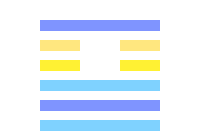
26.2.4.6 (26 > 55) - THE TÂ KHÛ HEXAGRAM.
- 2. The second line, undivided, shows a carriage with the strap under it removed.
- 4. The fourth line, divided, shows the young bull, (and yet) having the piece of wood over his horns. There will be great good fortune.
- 6. The sixth line, undivided, shows its subject (as) in command of the firmament of heaven. There will be progress.
26.2.4.6 (26 > 55) - Having to deal with an unprecedented crisis
Even the most cynical had not foreseen such calamities.
Bing DeepL Google Yandex26.2.4.6 (26 > 55) - Having to deal with an unprecedented crisis
Even the most cynical had not foreseen such calamities.
Bing DeepL Google Yandex26.2.4.6 (26 > 55) - Tá tchu, le pouvoir contraignant de la grandeur
Tá tchu : 1. Grand entretien ; 2. Dompter, conduire
- 2. (Comme, par exemple, quand) un char a perdu le cuir qui le maintient en place (droit).
- 4. Le joug, la planchette que porte le jeune boeuf est d’un usage très heureux pour le dompter et le former au labourage (second sens).
-
6. Combien la voie du ciel est étendue ! Qu’elle est immense à parcourir !
Allusion à la forme de l’hexagramme qui représente une montagne au-dessus du ciel. Se rapporte à l’expression tchu kih.
26.2.4.6 (26 > 55) - Avoir à gérer une crise sans précédent
Même les plus cyniques n'avaient pas prévu de telles calamités.
Bing DeepL Google Yandex26.2.4.6 (26 > 55) - Ellenőrzés
- 2. Otthagyja mert nem bíznak benne.
- 4. A másik erőszakosságának kezelése adakozással.
- 6. Kérik hogy javítsa meg.

26.1.2.4.6 (26 > 62) - THE TÂ KHÛ HEXAGRAM.
- 1. The first line, undivided, shows its subject in a position of peril. It will be advantageous for him to stop his advance.
- 2. The second line, undivided, shows a carriage with the strap under it removed.
- 4. The fourth line, divided, shows the young bull, (and yet) having the piece of wood over his horns. There will be great good fortune.
- 6. The sixth line, undivided, shows its subject (as) in command of the firmament of heaven. There will be progress.
26.1.2.4.6 (26 > 62) - Jumping through hoops
One goes through hardships that others have knowingly placed in the way.
Bing DeepL Google Yandex26.1.2.4.6 (26 > 62) - Jumping through hoops
One goes through hardships that others have knowingly placed in the way.
Bing DeepL Google Yandex26.1.2.4.6 (26 > 62) - Tá tchu, le pouvoir contraignant de la grandeur
Tá tchu : 1. Grand entretien ; 2. Dompter, conduire
- 1. Quand il survient quelque danger, il est bon de s’arrêter (se vaincre), de céder aux circonstances et de ne point vouloir l’emporter de force.
- 2. (Comme, par exemple, quand) un char a perdu le cuir qui le maintient en place (droit).
- 4. Le joug, la planchette que porte le jeune boeuf est d’un usage très heureux pour le dompter et le former au labourage (second sens).
-
6. Combien la voie du ciel est étendue ! Qu’elle est immense à parcourir !
Allusion à la forme de l’hexagramme qui représente une montagne au-dessus du ciel. Se rapporte à l’expression tchu kih.
26.1.2.4.6 (26 > 62) - Franchir un parcours d'obstacles
On traverse des épreuves que les autres ont placé sciemment en travers de la route.
Bing DeepL Google Yandex26.1.2.4.6 (26 > 62) - Ellenőrzés
- 1. Nem akar menni és azonnal megnézni mert nem olyan fontos.
- 2. Otthagyja mert nem bíznak benne.
- 4. A másik erőszakosságának kezelése adakozással.
- 6. Kérik hogy javítsa meg.

26.3.4.6 (26 > 54) - THE TÂ KHÛ HEXAGRAM.
- 3. The third line, undivided, shows its subject urging his way with good horses. It will be advantageous for him to realise the difficulty (of his course), and to be firm and correct, exercising himself daily in his charioteering and methods of defence; then there will be advantage in whatever direction he may advance.
- 4. The fourth line, divided, shows the young bull, (and yet) having the piece of wood over his horns. There will be great good fortune.
- 6. The sixth line, undivided, shows its subject (as) in command of the firmament of heaven. There will be progress.
26.3.4.6 (26 > 54) - Leaving others behind
One continues with one's buddies because the others do not have the same enthusiasm.
26.3.4.6 (26 > 54) - Leaving others behind
One continues with one's buddies because the others do not have the same enthusiasm.
26.3.4.6 (26 > 54) - Tá tchu, le pouvoir contraignant de la grandeur
Tá tchu : 1. Grand entretien ; 2. Dompter, conduire
- 3. Celui qui chemine avec des chevaux bien entretenus, sortira heureusement des difficultés. S’il s’exerce chaque jour à conduire et combattre, tout réussira pour lui. (Suite de la bonne éducation.)
- 4. Le joug, la planchette que porte le jeune boeuf est d’un usage très heureux pour le dompter et le former au labourage (second sens).
-
6. Combien la voie du ciel est étendue ! Qu’elle est immense à parcourir !
Allusion à la forme de l’hexagramme qui représente une montagne au-dessus du ciel. Se rapporte à l’expression tchu kih.
26.3.4.6 (26 > 54) - Lâcher les autres
On continue avec ses copains car les autres n'ont pas le même entrain.
Bing DeepL Google Yandex26.3.4.6 (26 > 54) - Ellenőrzés
- 3. Elkíséri.
- 4. A másik erőszakosságának kezelése adakozással.
- 6. Kérik hogy javítsa meg.

26.1.3.4.6 (26 > 40) - THE TÂ KHÛ HEXAGRAM.
- 1. The first line, undivided, shows its subject in a position of peril. It will be advantageous for him to stop his advance.
- 3. The third line, undivided, shows its subject urging his way with good horses. It will be advantageous for him to realise the difficulty (of his course), and to be firm and correct, exercising himself daily in his charioteering and methods of defence; then there will be advantage in whatever direction he may advance.
- 4. The fourth line, divided, shows the young bull, (and yet) having the piece of wood over his horns. There will be great good fortune.
- 6. The sixth line, undivided, shows its subject (as) in command of the firmament of heaven. There will be progress.
26.1.3.4.6 (26 > 40) - Enjoying an aperitif
One is having a chat over a nice drink while waiting for the preparation to be finished.
Bing DeepL Google Yandex26.1.3.4.6 (26 > 40) - Enjoying an aperitif
One is having a chat over a nice drink while waiting for the preparation to be finished.
Bing DeepL Google Yandex26.1.3.4.6 (26 > 40) - Tá tchu, le pouvoir contraignant de la grandeur
Tá tchu : 1. Grand entretien ; 2. Dompter, conduire
- 1. Quand il survient quelque danger, il est bon de s’arrêter (se vaincre), de céder aux circonstances et de ne point vouloir l’emporter de force.
- 3. Celui qui chemine avec des chevaux bien entretenus, sortira heureusement des difficultés. S’il s’exerce chaque jour à conduire et combattre, tout réussira pour lui. (Suite de la bonne éducation.)
- 4. Le joug, la planchette que porte le jeune boeuf est d’un usage très heureux pour le dompter et le former au labourage (second sens).
-
6. Combien la voie du ciel est étendue ! Qu’elle est immense à parcourir !
Allusion à la forme de l’hexagramme qui représente une montagne au-dessus du ciel. Se rapporte à l’expression tchu kih.
26.1.3.4.6 (26 > 40) - Prendre l'apéritif
On papote autour d'un bon verre en attendant que la préparation soit finie.
Bing DeepL Google Yandex26.1.3.4.6 (26 > 40) - Ellenőrzés
- 1. Nem akar menni és azonnal megnézni mert nem olyan fontos.
- 3. Elkíséri.
- 4. A másik erőszakosságának kezelése adakozással.
- 6. Kérik hogy javítsa meg.

26.2.3.4.6 (26 > 51) - THE TÂ KHÛ HEXAGRAM.
- 2. The second line, undivided, shows a carriage with the strap under it removed.
- 3. The third line, undivided, shows its subject urging his way with good horses. It will be advantageous for him to realise the difficulty (of his course), and to be firm and correct, exercising himself daily in his charioteering and methods of defence; then there will be advantage in whatever direction he may advance.
- 4. The fourth line, divided, shows the young bull, (and yet) having the piece of wood over his horns. There will be great good fortune.
- 6. The sixth line, undivided, shows its subject (as) in command of the firmament of heaven. There will be progress.
26.2.3.4.6 (26 > 51) - Thinking wisely
One is not doing well when one makes decisions that one abandons immediately afterwards.
Bing DeepL Google Yandex26.2.3.4.6 (26 > 51) - Thinking wisely
One is not doing well when one makes decisions that one abandons immediately afterwards.
Bing DeepL Google Yandex26.2.3.4.6 (26 > 51) - Tá tchu, le pouvoir contraignant de la grandeur
Tá tchu : 1. Grand entretien ; 2. Dompter, conduire
- 2. (Comme, par exemple, quand) un char a perdu le cuir qui le maintient en place (droit).
- 3. Celui qui chemine avec des chevaux bien entretenus, sortira heureusement des difficultés. S’il s’exerce chaque jour à conduire et combattre, tout réussira pour lui. (Suite de la bonne éducation.)
- 4. Le joug, la planchette que porte le jeune boeuf est d’un usage très heureux pour le dompter et le former au labourage (second sens).
-
6. Combien la voie du ciel est étendue ! Qu’elle est immense à parcourir !
Allusion à la forme de l’hexagramme qui représente une montagne au-dessus du ciel. Se rapporte à l’expression tchu kih.
26.2.3.4.6 (26 > 51) - Avoir de la suite dans les idées
On ne tourne pas rond quand on prend des décisions que l'on abandonne tout de suite après.
Bing DeepL Google Yandex26.2.3.4.6 (26 > 51) - Ellenőrzés
- 2. Otthagyja mert nem bíznak benne.
- 3. Elkíséri.
- 4. A másik erőszakosságának kezelése adakozással.
- 6. Kérik hogy javítsa meg.
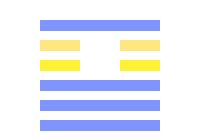
26.1.2.3.4.6 (26 > 16) - THE TÂ KHÛ HEXAGRAM.
- 1. The first line, undivided, shows its subject in a position of peril. It will be advantageous for him to stop his advance.
- 2. The second line, undivided, shows a carriage with the strap under it removed.
- 3. The third line, undivided, shows its subject urging his way with good horses. It will be advantageous for him to realise the difficulty (of his course), and to be firm and correct, exercising himself daily in his charioteering and methods of defence; then there will be advantage in whatever direction he may advance.
- 4. The fourth line, divided, shows the young bull, (and yet) having the piece of wood over his horns. There will be great good fortune.
- 6. The sixth line, undivided, shows its subject (as) in command of the firmament of heaven. There will be progress.
26.1.2.3.4.6 (26 > 16) - Paving the way for research
One sharpens one's hypothesis by calling for new studies.
Bing DeepL Google Yandex26.1.2.3.4.6 (26 > 16) - Paving the way for research
One sharpens one's hypothesis by calling for new studies.
Bing DeepL Google Yandex26.1.2.3.4.6 (26 > 16) - Tá tchu, le pouvoir contraignant de la grandeur
Tá tchu : 1. Grand entretien ; 2. Dompter, conduire
- 1. Quand il survient quelque danger, il est bon de s’arrêter (se vaincre), de céder aux circonstances et de ne point vouloir l’emporter de force.
- 2. (Comme, par exemple, quand) un char a perdu le cuir qui le maintient en place (droit).
- 3. Celui qui chemine avec des chevaux bien entretenus, sortira heureusement des difficultés. S’il s’exerce chaque jour à conduire et combattre, tout réussira pour lui. (Suite de la bonne éducation.)
- 4. Le joug, la planchette que porte le jeune boeuf est d’un usage très heureux pour le dompter et le former au labourage (second sens).
-
6. Combien la voie du ciel est étendue ! Qu’elle est immense à parcourir !
Allusion à la forme de l’hexagramme qui représente une montagne au-dessus du ciel. Se rapporte à l’expression tchu kih.
26.1.2.3.4.6 (26 > 16) - Ouvrir la voie à la recherche
On affute son hypothèse en réclamant de nouvelles études.
Bing DeepL Google Yandex26.1.2.3.4.6 (26 > 16) - Ellenőrzés
- 1. Nem akar menni és azonnal megnézni mert nem olyan fontos.
- 2. Otthagyja mert nem bíznak benne.
- 3. Elkíséri.
- 4. A másik erőszakosságának kezelése adakozással.
- 6. Kérik hogy javítsa meg.

26.4.5.6 (26 > 43) - THE TÂ KHÛ HEXAGRAM.
- 4. The fourth line, divided, shows the young bull, (and yet) having the piece of wood over his horns. There will be great good fortune.
- 5. The fifth line, divided, shows the teeth of a castrated hog. There will be good fortune.
- 6. The sixth line, undivided, shows its subject (as) in command of the firmament of heaven. There will be progress.
26.4.5.6 (26 > 43) - Plugging holes
One is preparing to replace those one has lost.
Bing DeepL Google Yandex26.4.5.6 (26 > 43) - Plugging holes
One is preparing to replace those one has lost.
Bing DeepL Google Yandex26.4.5.6 (26 > 43) - Tá tchu, le pouvoir contraignant de la grandeur
Tá tchu : 1. Grand entretien ; 2. Dompter, conduire
- 4. Le joug, la planchette que porte le jeune boeuf est d’un usage très heureux pour le dompter et le former au labourage (second sens).
- 5. Lorsqu’un sanglier est châtré, dompté, ses défenses sont exemptes de danger (et sont plutôt un instrument utile). — Arracher les dents à un sanglier, c’est priver un méchant des moyens de nuire.
-
6. Combien la voie du ciel est étendue ! Qu’elle est immense à parcourir !
Allusion à la forme de l’hexagramme qui représente une montagne au-dessus du ciel. Se rapporte à l’expression tchu kih.
26.4.5.6 (26 > 43) - Boucher les trous
On se prépare à remplacer ceux qu'on a perdu.
Bing DeepL Google Yandex26.4.5.6 (26 > 43) - Ellenőrzés
- 4. A másik erőszakosságának kezelése adakozással.
- 5. Vár amíg a legfiatalabb visszatér javítani.
- 6. Kérik hogy javítsa meg.

26.1.4.5.6 (26 > 28) - THE TÂ KHÛ HEXAGRAM.
- 1. The first line, undivided, shows its subject in a position of peril. It will be advantageous for him to stop his advance.
- 4. The fourth line, divided, shows the young bull, (and yet) having the piece of wood over his horns. There will be great good fortune.
- 5. The fifth line, divided, shows the teeth of a castrated hog. There will be good fortune.
- 6. The sixth line, undivided, shows its subject (as) in command of the firmament of heaven. There will be progress.
26.1.4.5.6 (26 > 28) - Drawing an outline
One traces a line around the established perimeter.
Bing DeepL Google Yandex26.1.4.5.6 (26 > 28) - Drawing an outline
One traces a line around the established perimeter.
Bing DeepL Google Yandex26.1.4.5.6 (26 > 28) - Tá tchu, le pouvoir contraignant de la grandeur
Tá tchu : 1. Grand entretien ; 2. Dompter, conduire
- 1. Quand il survient quelque danger, il est bon de s’arrêter (se vaincre), de céder aux circonstances et de ne point vouloir l’emporter de force.
- 4. Le joug, la planchette que porte le jeune boeuf est d’un usage très heureux pour le dompter et le former au labourage (second sens).
- 5. Lorsqu’un sanglier est châtré, dompté, ses défenses sont exemptes de danger (et sont plutôt un instrument utile). — Arracher les dents à un sanglier, c’est priver un méchant des moyens de nuire.
-
6. Combien la voie du ciel est étendue ! Qu’elle est immense à parcourir !
Allusion à la forme de l’hexagramme qui représente une montagne au-dessus du ciel. Se rapporte à l’expression tchu kih.
26.1.4.5.6 (26 > 28) - Dessiner le contour
On trace un trait autour du périmètre que l'on a établi.
Bing DeepL Google Yandex26.1.4.5.6 (26 > 28) - Ellenőrzés
- 1. Nem akar menni és azonnal megnézni mert nem olyan fontos.
- 4. A másik erőszakosságának kezelése adakozással.
- 5. Vár amíg a legfiatalabb visszatér javítani.
- 6. Kérik hogy javítsa meg.
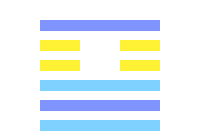
26.2.4.5.6 (26 > 49) - THE TÂ KHÛ HEXAGRAM.
- 2. The second line, undivided, shows a carriage with the strap under it removed.
- 4. The fourth line, divided, shows the young bull, (and yet) having the piece of wood over his horns. There will be great good fortune.
- 5. The fifth line, divided, shows the teeth of a castrated hog. There will be good fortune.
- 6. The sixth line, undivided, shows its subject (as) in command of the firmament of heaven. There will be progress.
26.2.4.5.6 (26 > 49) - Needing to be comforted
One rushes when the others call because one is overwhelmed with worry.
Bing DeepL Google Yandex26.2.4.5.6 (26 > 49) - Needing to be comforted
One rushes when the others call because one is overwhelmed with worry.
Bing DeepL Google Yandex26.2.4.5.6 (26 > 49) - Tá tchu, le pouvoir contraignant de la grandeur
Tá tchu : 1. Grand entretien ; 2. Dompter, conduire
- 2. (Comme, par exemple, quand) un char a perdu le cuir qui le maintient en place (droit).
- 4. Le joug, la planchette que porte le jeune boeuf est d’un usage très heureux pour le dompter et le former au labourage (second sens).
- 5. Lorsqu’un sanglier est châtré, dompté, ses défenses sont exemptes de danger (et sont plutôt un instrument utile). — Arracher les dents à un sanglier, c’est priver un méchant des moyens de nuire.
-
6. Combien la voie du ciel est étendue ! Qu’elle est immense à parcourir !
Allusion à la forme de l’hexagramme qui représente une montagne au-dessus du ciel. Se rapporte à l’expression tchu kih.
26.2.4.5.6 (26 > 49) - Avoir besoin de réconfort
On accourt quand les autres appellent car on déborde d'inquiétude.
Bing DeepL Google Yandex26.2.4.5.6 (26 > 49) - Ellenőrzés
- 2. Otthagyja mert nem bíznak benne.
- 4. A másik erőszakosságának kezelése adakozással.
- 5. Vár amíg a legfiatalabb visszatér javítani.
- 6. Kérik hogy javítsa meg.

26.1.2.4.5.6 (26 > 31) - THE TÂ KHÛ HEXAGRAM.
- 1. The first line, undivided, shows its subject in a position of peril. It will be advantageous for him to stop his advance.
- 2. The second line, undivided, shows a carriage with the strap under it removed.
- 4. The fourth line, divided, shows the young bull, (and yet) having the piece of wood over his horns. There will be great good fortune.
- 5. The fifth line, divided, shows the teeth of a castrated hog. There will be good fortune.
- 6. The sixth line, undivided, shows its subject (as) in command of the firmament of heaven. There will be progress.
26.1.2.4.5.6 (26 > 31) - Getting a head start
One hopes to be able to declare one's flame before the others.
Bing DeepL Google Yandex26.1.2.4.5.6 (26 > 31) - Getting a head start
One hopes to be able to declare one's flame before the others.
Bing DeepL Google Yandex26.1.2.4.5.6 (26 > 31) - Tá tchu, le pouvoir contraignant de la grandeur
Tá tchu : 1. Grand entretien ; 2. Dompter, conduire
- 1. Quand il survient quelque danger, il est bon de s’arrêter (se vaincre), de céder aux circonstances et de ne point vouloir l’emporter de force.
- 2. (Comme, par exemple, quand) un char a perdu le cuir qui le maintient en place (droit).
- 4. Le joug, la planchette que porte le jeune boeuf est d’un usage très heureux pour le dompter et le former au labourage (second sens).
- 5. Lorsqu’un sanglier est châtré, dompté, ses défenses sont exemptes de danger (et sont plutôt un instrument utile). — Arracher les dents à un sanglier, c’est priver un méchant des moyens de nuire.
-
6. Combien la voie du ciel est étendue ! Qu’elle est immense à parcourir !
Allusion à la forme de l’hexagramme qui représente une montagne au-dessus du ciel. Se rapporte à l’expression tchu kih.
26.1.2.4.5.6 (26 > 31) - Prendre de vitesse
On espère pouvoir déclarer sa flamme avant les autres.
Bing DeepL Google Yandex26.1.2.4.5.6 (26 > 31) - Ellenőrzés
- 1. Nem akar menni és azonnal megnézni mert nem olyan fontos.
- 2. Otthagyja mert nem bíznak benne.
- 4. A másik erőszakosságának kezelése adakozással.
- 5. Vár amíg a legfiatalabb visszatér javítani.
- 6. Kérik hogy javítsa meg.

26.3.4.5.6 (26 > 58) - THE TÂ KHÛ HEXAGRAM.
- 3. The third line, undivided, shows its subject urging his way with good horses. It will be advantageous for him to realise the difficulty (of his course), and to be firm and correct, exercising himself daily in his charioteering and methods of defence; then there will be advantage in whatever direction he may advance.
- 4. The fourth line, divided, shows the young bull, (and yet) having the piece of wood over his horns. There will be great good fortune.
- 5. The fifth line, divided, shows the teeth of a castrated hog. There will be good fortune.
- 6. The sixth line, undivided, shows its subject (as) in command of the firmament of heaven. There will be progress.
26.3.4.5.6 (26 > 58) - Magnifying
One increases the distance from which others can watch.
Bing DeepL Google Yandex26.3.4.5.6 (26 > 58) - Magnifying
One increases the distance from which others can watch.
Bing DeepL Google Yandex26.3.4.5.6 (26 > 58) - Tá tchu, le pouvoir contraignant de la grandeur
Tá tchu : 1. Grand entretien ; 2. Dompter, conduire
- 3. Celui qui chemine avec des chevaux bien entretenus, sortira heureusement des difficultés. S’il s’exerce chaque jour à conduire et combattre, tout réussira pour lui. (Suite de la bonne éducation.)
- 4. Le joug, la planchette que porte le jeune boeuf est d’un usage très heureux pour le dompter et le former au labourage (second sens).
- 5. Lorsqu’un sanglier est châtré, dompté, ses défenses sont exemptes de danger (et sont plutôt un instrument utile). — Arracher les dents à un sanglier, c’est priver un méchant des moyens de nuire.
-
6. Combien la voie du ciel est étendue ! Qu’elle est immense à parcourir !
Allusion à la forme de l’hexagramme qui représente une montagne au-dessus du ciel. Se rapporte à l’expression tchu kih.
26.3.4.5.6 (26 > 58) - Magnifier
On accroît la distance depuis laquelle les autres pourront regarder.
Bing DeepL Google Yandex26.3.4.5.6 (26 > 58) - Ellenőrzés
- 3. Elkíséri.
- 4. A másik erőszakosságának kezelése adakozással.
- 5. Vár amíg a legfiatalabb visszatér javítani.
- 6. Kérik hogy javítsa meg.
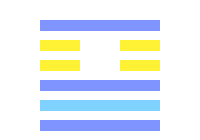
26.1.3.4.5.6 (26 > 47) - THE TÂ KHÛ HEXAGRAM.
- 1. The first line, undivided, shows its subject in a position of peril. It will be advantageous for him to stop his advance.
- 3. The third line, undivided, shows its subject urging his way with good horses. It will be advantageous for him to realise the difficulty (of his course), and to be firm and correct, exercising himself daily in his charioteering and methods of defence; then there will be advantage in whatever direction he may advance.
- 4. The fourth line, divided, shows the young bull, (and yet) having the piece of wood over his horns. There will be great good fortune.
- 5. The fifth line, divided, shows the teeth of a castrated hog. There will be good fortune.
- 6. The sixth line, undivided, shows its subject (as) in command of the firmament of heaven. There will be progress.
26.1.3.4.5.6 (26 > 47) - Imposing deadlines
One penalises those who have not been able to respond in a timely manner.
Bing DeepL Google Yandex26.1.3.4.5.6 (26 > 47) - Imposing deadlines
One penalizes those who have not been able to respond in a timely manner.
Bing DeepL Google Yandex26.1.3.4.5.6 (26 > 47) - Tá tchu, le pouvoir contraignant de la grandeur
Tá tchu : 1. Grand entretien ; 2. Dompter, conduire
- 1. Quand il survient quelque danger, il est bon de s’arrêter (se vaincre), de céder aux circonstances et de ne point vouloir l’emporter de force.
- 3. Celui qui chemine avec des chevaux bien entretenus, sortira heureusement des difficultés. S’il s’exerce chaque jour à conduire et combattre, tout réussira pour lui. (Suite de la bonne éducation.)
- 4. Le joug, la planchette que porte le jeune boeuf est d’un usage très heureux pour le dompter et le former au labourage (second sens).
- 5. Lorsqu’un sanglier est châtré, dompté, ses défenses sont exemptes de danger (et sont plutôt un instrument utile). — Arracher les dents à un sanglier, c’est priver un méchant des moyens de nuire.
-
6. Combien la voie du ciel est étendue ! Qu’elle est immense à parcourir !
Allusion à la forme de l’hexagramme qui représente une montagne au-dessus du ciel. Se rapporte à l’expression tchu kih.
26.1.3.4.5.6 (26 > 47) - Imposer des délais
On pénalise ceux qui n'ont pas su répondre en temps utile.
Bing DeepL Google Yandex26.1.3.4.5.6 (26 > 47) - Ellenőrzés
- 1. Nem akar menni és azonnal megnézni mert nem olyan fontos.
- 3. Elkíséri.
- 4. A másik erőszakosságának kezelése adakozással.
- 5. Vár amíg a legfiatalabb visszatér javítani.
- 6. Kérik hogy javítsa meg.

26.2.3.4.5.6 (26 > 17) - THE TÂ KHÛ HEXAGRAM.
- 2. The second line, undivided, shows a carriage with the strap under it removed.
- 3. The third line, undivided, shows its subject urging his way with good horses. It will be advantageous for him to realise the difficulty (of his course), and to be firm and correct, exercising himself daily in his charioteering and methods of defence; then there will be advantage in whatever direction he may advance.
- 4. The fourth line, divided, shows the young bull, (and yet) having the piece of wood over his horns. There will be great good fortune.
- 5. The fifth line, divided, shows the teeth of a castrated hog. There will be good fortune.
- 6. The sixth line, undivided, shows its subject (as) in command of the firmament of heaven. There will be progress.
26.2.3.4.5.6 (26 > 17) - Self-censorship
One learns to pay attention to the ideas one develops when they may offend the sensibilities of younger people.
Bing DeepL Google Yandex26.2.3.4.5.6 (26 > 17) - Self-censorship
One learns to pay attention to the ideas one develops when they may offend the sensibilities of younger people.
Bing DeepL Google Yandex26.2.3.4.5.6 (26 > 17) - Tá tchu, le pouvoir contraignant de la grandeur
Tá tchu : 1. Grand entretien ; 2. Dompter, conduire
- 2. (Comme, par exemple, quand) un char a perdu le cuir qui le maintient en place (droit).
- 3. Celui qui chemine avec des chevaux bien entretenus, sortira heureusement des difficultés. S’il s’exerce chaque jour à conduire et combattre, tout réussira pour lui. (Suite de la bonne éducation.)
- 4. Le joug, la planchette que porte le jeune boeuf est d’un usage très heureux pour le dompter et le former au labourage (second sens).
- 5. Lorsqu’un sanglier est châtré, dompté, ses défenses sont exemptes de danger (et sont plutôt un instrument utile). — Arracher les dents à un sanglier, c’est priver un méchant des moyens de nuire.
-
6. Combien la voie du ciel est étendue ! Qu’elle est immense à parcourir !
Allusion à la forme de l’hexagramme qui représente une montagne au-dessus du ciel. Se rapporte à l’expression tchu kih.
26.2.3.4.5.6 (26 > 17) - S'auto-censurer
On apprend à faire attention aux idées que l'on développe quand elles peuvent heurter la sensibilité des plus jeunes.
Bing DeepL Google Yandex26.2.3.4.5.6 (26 > 17) - Ellenőrzés
- 2. Otthagyja mert nem bíznak benne.
- 3. Elkíséri.
- 4. A másik erőszakosságának kezelése adakozással.
- 5. Vár amíg a legfiatalabb visszatér javítani.
- 6. Kérik hogy javítsa meg.
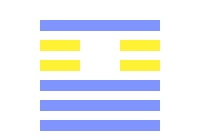
26.1.2.3.4.5.6 (26 > 45) - THE TÂ KHÛ HEXAGRAM.
- 1. The first line, undivided, shows its subject in a position of peril. It will be advantageous for him to stop his advance.
- 2. The second line, undivided, shows a carriage with the strap under it removed.
- 3. The third line, undivided, shows its subject urging his way with good horses. It will be advantageous for him to realise the difficulty (of his course), and to be firm and correct, exercising himself daily in his charioteering and methods of defence; then there will be advantage in whatever direction he may advance.
- 4. The fourth line, divided, shows the young bull, (and yet) having the piece of wood over his horns. There will be great good fortune.
- 5. The fifth line, divided, shows the teeth of a castrated hog. There will be good fortune.
- 6. The sixth line, undivided, shows its subject (as) in command of the firmament of heaven. There will be progress.
26.1.2.3.4.5.6 (26 > 45) - Losing all one's strength
One surrenders before the enemy because the troops did not survive after the assault.
Bing DeepL Google Yandex26.1.2.3.4.5.6 (26 > 45) - Losing all one's strength
One surrenders before the enemy because the troops did not survive after the assault.
Bing DeepL Google Yandex26.1.2.3.4.5.6 (26 > 45) - Tá tchu, le pouvoir contraignant de la grandeur
Tá tchu : 1. Grand entretien ; 2. Dompter, conduire
- 1. Quand il survient quelque danger, il est bon de s’arrêter (se vaincre), de céder aux circonstances et de ne point vouloir l’emporter de force.
- 2. (Comme, par exemple, quand) un char a perdu le cuir qui le maintient en place (droit).
- 3. Celui qui chemine avec des chevaux bien entretenus, sortira heureusement des difficultés. S’il s’exerce chaque jour à conduire et combattre, tout réussira pour lui. (Suite de la bonne éducation.)
- 4. Le joug, la planchette que porte le jeune boeuf est d’un usage très heureux pour le dompter et le former au labourage (second sens).
- 5. Lorsqu’un sanglier est châtré, dompté, ses défenses sont exemptes de danger (et sont plutôt un instrument utile). — Arracher les dents à un sanglier, c’est priver un méchant des moyens de nuire.
-
6. Combien la voie du ciel est étendue ! Qu’elle est immense à parcourir !
Allusion à la forme de l’hexagramme qui représente une montagne au-dessus du ciel. Se rapporte à l’expression tchu kih.
26.1.2.3.4.5.6 (26 > 45) - Perdre toutes ses forces
On capitule devant l'ennemi car les troupes n'ont pas survécu après l'assaut.
Bing DeepL Google Yandex26.1.2.3.4.5.6 (26 > 45) - Ellenőrzés
- 1. Nem akar menni és azonnal megnézni mert nem olyan fontos.
- 2. Otthagyja mert nem bíznak benne.
- 3. Elkíséri.
- 4. A másik erőszakosságának kezelése adakozással.
- 5. Vár amíg a legfiatalabb visszatér javítani.
- 6. Kérik hogy javítsa meg.

